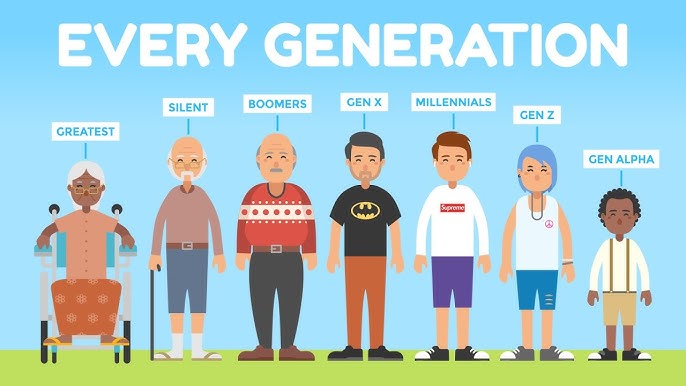The Evolution of Coding: How Different Generations Interact with Technology
Jan 10, 2025
Read: Is Coding a Good Career Path? Exploring Opportunities and Salaries
Read: What is the Right Age to Start Coding?
As technology progresses, every generation has formed its own relationship with coding, starting with the pioneers of computing and extending to the digitally native generation. From punch cards to artificial intelligence (AI) and blockchain, coding has been an integral part of shaping the digital age. The way each generation interacts with coding has evolved, reflecting both technological advancements and societal shifts. Let’s explore the coding experiences of Baby Boomers, Generation X, Millennials, Generation Z, Generation Alpha, and now Generation Beta—the new wave of young coders born into a world where programming is becoming a second language.
Baby Boomers (Born 1946–1964): Pioneering the Digital Age
Baby Boomers were the first generation to experience the birth of the personal computer and early programming languages. For them, coding was not something that was taught in schools or casually picked up; it was a specialized skill reserved for a select few. As computer science began to emerge as a field of study, coding became crucial for the development of systems and software.
Key Coding Experiences for Baby Boomers:
Early Programming Languages: Baby Boomers learned languages like Fortran, COBOL, and Assembly that were highly technical and required a deep understanding of hardware and systems. These languages are still widely used in legacy systems today.
Mainframes and Punch Cards: Most coding was done on mainframe computers or via punch cards, requiring meticulous attention to detail and precision. These early computing environments shaped how later generations approached coding.
Career-Based Coding: For Baby Boomers, coding was a professional skill largely used in fields like banking, engineering, and scientific research. Computer programming was typically taught in university or learned through hands-on experience in the workplace.
Although programming was more difficult and inaccessible by today’s standards, Baby Boomers laid the groundwork for the digital revolution.
Generation X (Born 1965–1980): Bridging the Gap Between Analog and Digital
Generation X was the first to experience the shift from analog to digital. With the advent of personal computers and the early stages of the internet, learning to code began to move from a specialized skill to something that could be picked up by tech enthusiasts and young students. This generation was also the first to embrace early video game programming and web development.
Key Coding Experiences for Generation X:
Introduction of Personal Computers: The release of the Commodore 64, Apple II, and IBM PC made computers more accessible in homes and schools. As a result, Generation X encountered languages like BASIC and Pascal, which were easier to learn compared to earlier, more complex programming languages.
Early Web Development: The rise of the internet in the 1990s saw Gen Xers experimenting with early forms of HTML, JavaScript, and CSS. These web technologies allowed them to build websites and connect with others across the globe.
Video Game Development: Many Gen Xers explored coding games and digital entertainment, learning the basics of game engines and even contributing to early gaming development.
For Generation X, coding marked the shift from manual to digital, offering new career opportunities and laying the foundation for web development as a mainstream field.
Millennials (Born 1981–1996): Coding Becomes Mainstream
Millennials grew up during the internet boom, and for them, coding for the web was essential. Coding wasn’t just a professional skill; it was a creative tool, helping people build blogs, websites, and even launch tech startups. With the internet and mobile technology exploding, Millennials witnessed the rise of app development, social media platforms, and the introduction of open-source software that empowered self-taught programmers.
Key Coding Experiences for Millennials:
The Rise of Web Development: With the advent of WordPress, HTML5, and JavaScript, Millennials had access to powerful tools to create personal websites and blogs. Many started coding out of personal interest and built platforms that now define the internet.
Open-Source Movement: Millennials were the first to embrace the power of open-source software. Platforms like GitHub and GitLab became important for collaboration, and tools like Linux offered alternatives to proprietary software.
Coding Bootcamps and Online Learning: With the rise of online learning platforms like Codecademy, freeCodeCamp, and Udemy, many Millennials learned to code independently, often transitioning into software development careers without formal computer science degrees.
Mobile App Development: The explosion of smartphones led to the development of mobile apps. Millennials led the charge, learning to code in languages like Swift for iOS and Java for Android, building apps for everything from fitness to entertainment.
For Millennials, coding was both a creative outlet and a career skill. They not only helped drive the mobile app revolution but also pioneered the freelance developer culture.
Generation Z (Born 1997–2012): Coding as a Part of Everyday Life
Generation Z, the "digital natives," grew up surrounded by smartphones, social media, and constant connectivity. For them, coding for kids is not just something learned in a computer lab; it’s a skill that is woven into daily life through apps, games, and social media platforms. They are already coding at younger ages, thanks to platforms that make coding for beginners fun and interactive.
Key Coding Experiences for Generation Z:
Coding in the Classroom: Many schools now offer coding as part of the curriculum, with languages like Scratch, Python, and HTML introduced as early as elementary school. Tools like Tynker and Code.org make coding fun and interactive.
Gamified Learning: Platforms like CodeCombat and Khan Academy gamify the learning process, turning coding into an engaging activity rather than a complex skill. Gen Z students can earn rewards as they level up in learning programming languages.
App Development and Social Media: With the rise of social media platforms like TikTok and Instagram, Gen Z has become creators of content, learning to code and create custom filters, websites, and even digital art.
Side Projects and Freelancing: Generation Z has the tools at their fingertips to build websites, apps, and even launch their own businesses. Platforms like Replit and GitHub give them the ability to share projects and collaborate with others around the world.
For Gen Z, coding is an everyday skill, used not only for school projects but also for creating content and innovating on the internet. Many will likely grow into careers in software engineering, game development, or data science.
Generation Alpha (Born 2013–2025): Growing Up with Code
Generation Alpha is the first generation to grow up in a world where digital technology and coding are embedded in everyday life. They will experience the next wave of coding tools and innovations, likely learning programming languages for kids before they even enter formal education. With the rise of AI-powered education tools and smart devices in the home, the journey into coding will be seamless.
Key Coding Experiences for Generation Alpha:
Early Exposure to Coding: Tools like Kano and Osmo introduce children to coding in an interactive way, using games and hands-on activities. These products make coding fun and easy to understand at a young age.
Robotics and AI: Generation Alpha will grow up in a world where robots and artificial intelligence are integrated into their daily lives. Programming robots and creating AI will likely be commonplace as part of their education.
AR/VR Integration: With augmented reality (AR) and virtual reality (VR) becoming more mainstream, Generation Alpha could learn to code in immersive environments, creating virtual worlds and programming interactive experiences.
Digital Citizenship and Security: Coding will also be integral in understanding the concepts of digital security and data privacy, helping them navigate the challenges of a connected world safely.
For Generation Alpha, coding will be an essential skill, enabling them to interact with the rapidly advancing technologies that will shape their futures. Whether it's creating digital art, solving global problems, or interacting with AI, coding will be a fundamental part of their lives.
Generation Beta (Born 2026–Present): The Future of Coding
Generation Beta is still in its infancy, but the technological landscape they will grow up in promises to radically shape their coding experiences. With quantum computing, blockchain, and AI-driven coding platforms on the horizon, Generation Beta will likely learn coding in ways that go far beyond anything we can imagine today.
Key Predictions for Generation Beta’s Coding Experiences:
AI-Driven Learning: Generation Beta will likely learn programming through AI-powered platforms that adapt to their individual learning styles. Coding lessons will be tailored to their pace, helping them grasp advanced concepts quickly.
Quantum Computing: As quantum computing continues to evolve, Generation Beta may learn quantum programming languages and experiment with quantum algorithms, preparing them for a world where classical computing might no longer suffice.
Immersive AR/VR Coding Environments: Learning to code in virtual reality or augmented reality will become commonplace, allowing students to interact with code in a 3D space and test projects in real-time.
Coding for Creativity and Sustainability: Generation Beta will likely use coding to tackle global challenges like climate change, developing apps, software, and technologies that drive environmental sustainability and social good.
For Generation Beta, coding will be more than just a tool for personal projects—it will be integral to their ability to shape a future that is both technologically advanced and ethically conscious.
Conclusion: A Shared Journey Through Time
Each generation has contributed to the evolution of coding, from Baby Boomers pioneering early programming languages to Generation Beta possibly learning to code in immersive, AI-powered environments. The journey reflects the rapid advancement of technology and how coding has become a universal skill—essential for problem-solving, creativity, and innovation in today's world.
As we look ahead, it’s clear that coding will continue to evolve, with newer generations engaging with artificial intelligence, quantum computing, and blockchain technologies to solve problems and create new opportunities. The future is coding, and it’s an exciting time to be a part of this digital revolution.
How did your generation experience coding? Share your thoughts or experiences in the comments! Let’s continue the conversation and celebrate the evolution of coding across the generations.
Read: The Best Ways to Teach Kids Coding in 2025: Expert Tips, Tools, and Methods for Success
Read: Which is the Best Way for Your Teen to Learn Coding in 2025?
Pinecone Coding Academy's Kids Coding Program
At Pinecone Coding Academy, we are passionate about making coding accessible and enjoyable for kids aged 8-17. Our program is designed to inspire and equip young learners with the skills they need to thrive in the digital world.
Click here to discover a coding class that matches your teen's or child's interests.
What We Offer:
Engaging Curriculum: Our courses introduce students to popular programming languages like Python, JavaScript, and HTML/CSS, laying a strong foundation for future learning.
Hands-On Projects: Students participate in project-based learning, creating real applications that they can showcase, from interactive games to personal websites.
Mentorship and Support: Our experienced instructors provide guidance, helping students navigate challenges and discover their coding potential.
Community Connection: By joining Pinecone, students become part of a vibrant community of peers, fostering collaboration and friendship as they learn.
Try a Free Session!
If your child is curious about coding, Pinecone Coding Academy offers a free introductory session for kids aged 8-17. This is a fantastic opportunity to explore programming in a fun and engaging way.
More blogs







